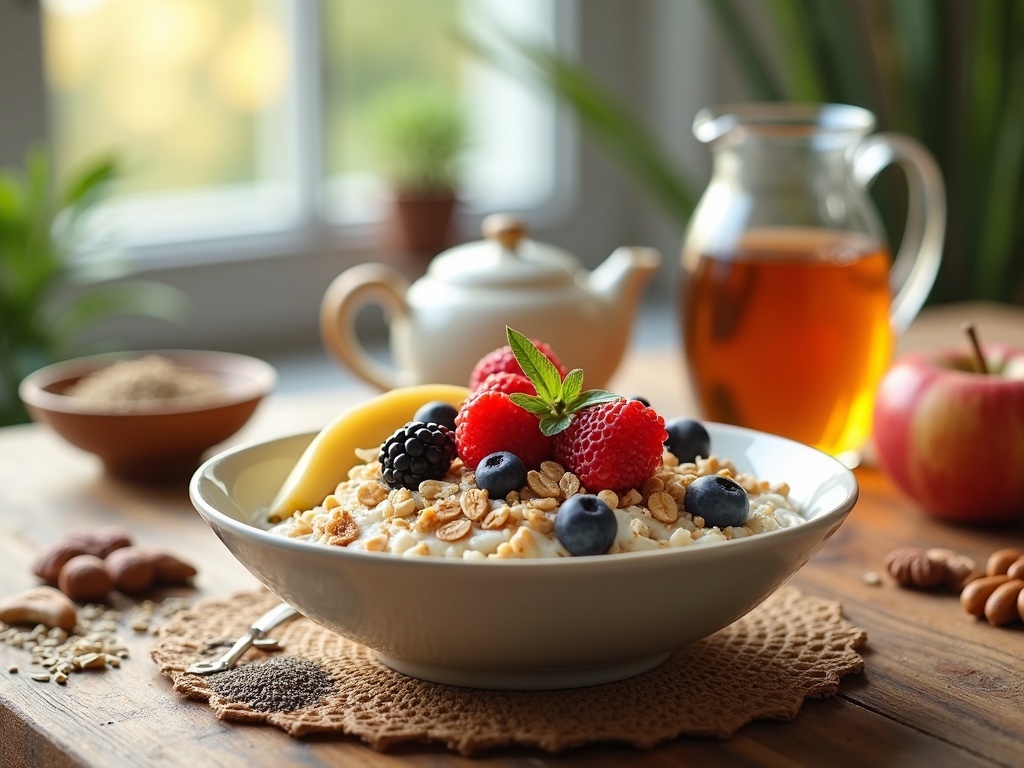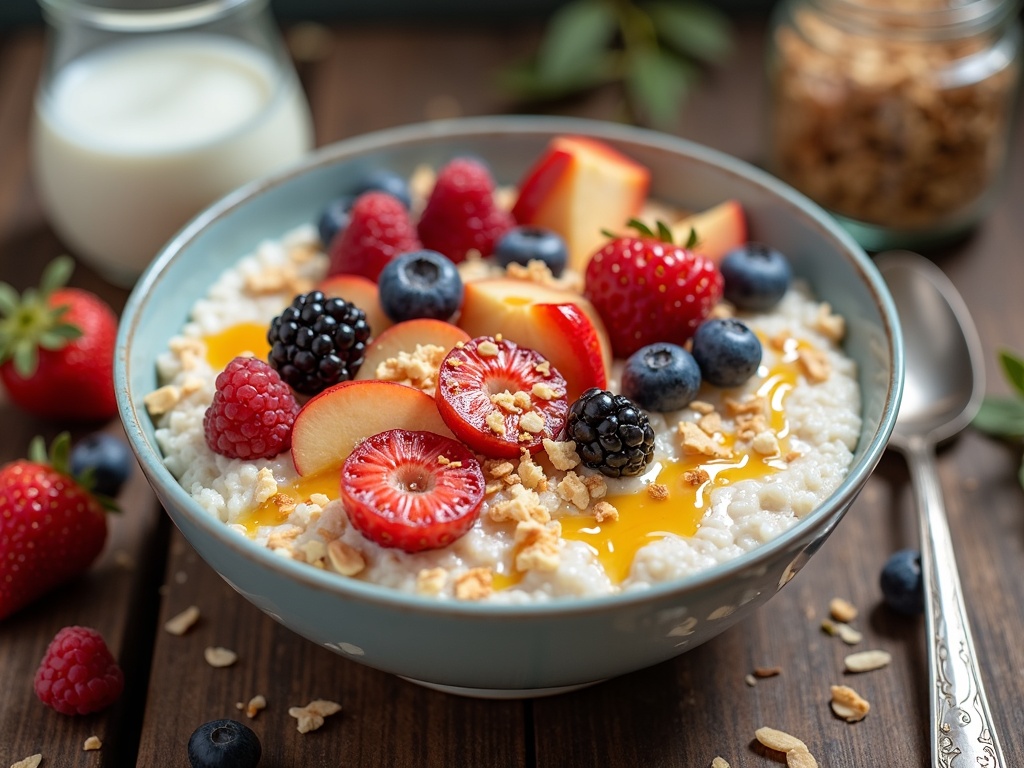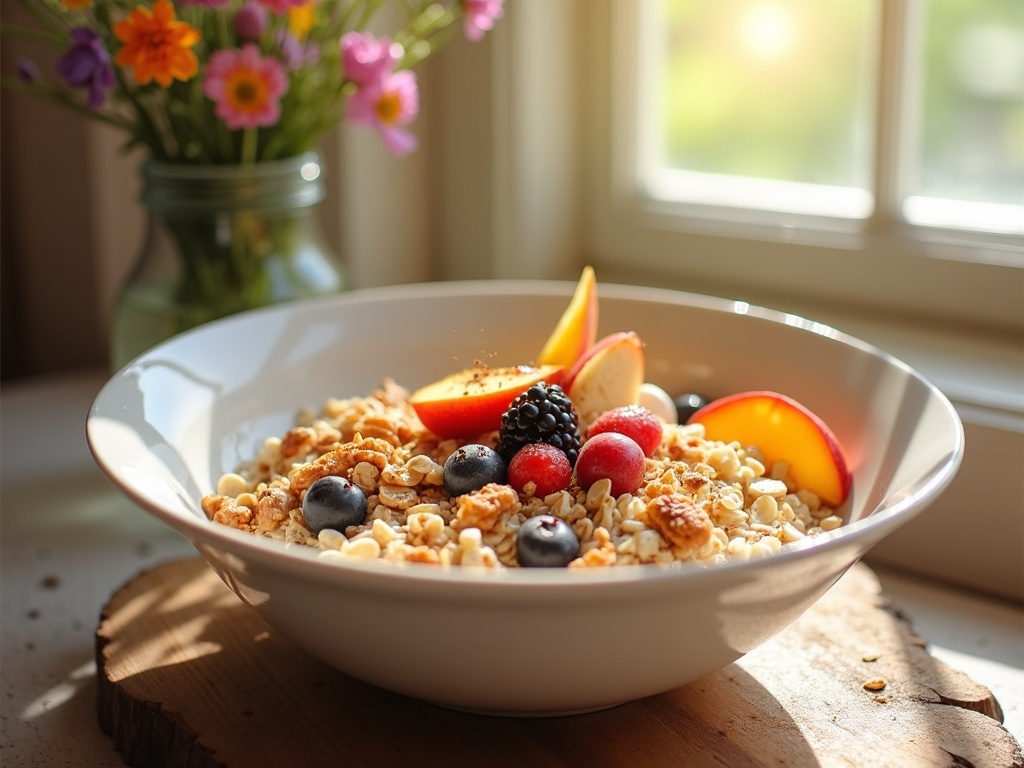Bircher muesli, created in 1900 by Swiss physician Maximilian Bircher-Brenner as a therapeutic meal for his sanatorium patients, has transformed from medicine to a global breakfast favorite. This nutrient-rich dish mixes overnight-soaked oats with fresh fruits, nuts, and milk, offering a balanced mix of complex carbs, protein, and healthy fats that fuel your body through the morning.
Find In This Article
Key Takeaways
- Bircher muesli delivers impressive nutrition with 10-15g of protein and 8-12g of fiber per serving, promoting heart health through oats containing beneficial beta-glucans.
- The traditional preparation requires just 10 minutes of prep plus 8-12 hours of soaking time, making it an ideal make-ahead breakfast option.
- The dish is highly customizable with seasonal fruits, spices, and various plant-based alternatives for those following dairy-free or vegan diets.
- Bircher muesli has seen an 11% growth in popularity between 2019-2021, aligning perfectly with current trends toward nutrient-dense, minimally processed foods.
- Unlike typical breakfast cereals, it provides steady energy without sugar spikes, making it particularly appealing to health-conscious consumers.
Why This Swiss Breakfast Became a Global Health Sensation
Bircher muesli has transformed breakfast tables worldwide since its inception in 1900, but its origins are surprisingly clinical. Swiss physician Maximilian Bircher-Brenner created this dish for patients at his sanatorium in Zurich, not expecting it would eventually grace breakfast menus across continents.
A Physician’s Revolutionary Creation
Dr. Bircher-Brenner developed his famous muesli with clear intentions. Unlike the heavy, cooked breakfasts common in early 20th century Europe—typically featuring eggs, meats, and breads—he wanted something that delivered nutrition in its purest form. His concoction incorporated raw oats soaked overnight, fresh fruits, nuts, and milk. This approach was radical for its time when most people couldn’t imagine eating uncooked oats as a meal.
I find it fascinating that what began as a therapeutic food eventually became a mainstream breakfast option. The doctor strongly believed in the healing powers of raw foods, particularly fruits and vegetables. His approach was so unconventional that many medical colleagues initially dismissed his ideas as outlandish.
From Medicine to Mainstream
The transition from hospital food to global sensation happened gradually. Dr. Bircher-Brenner’s original recipe included:
- Fresh apples (including skin and core)
- Nuts for protein and healthy fats
- Raw oats soaked to improve digestibility
- Condensed milk (though modern versions use various milk alternatives)
- Lemon juice to prevent browning
The simplicity of preparation and the complete nutritional profile made this dish perfect for the health-conscious. Today’s versions build on these fundamentals while adding countless variations—from baked oats inspired by muesli to more traditional oats recipes that honor the doctor’s original vision.
What made Bircher muesli truly revolutionary was how it challenged prevailing attitudes about nutrition. At a time when raw foods were often viewed with suspicion, the doctor championed them based on his observations of improved patient outcomes. He noticed patients digested raw foods better and showed improved vitality compared to those eating conventional diets.
The doctor’s timing was perfect. As industrialization advanced, people became increasingly interested in natural living and foods that reconnected them with nature. Bircher muesli offered exactly that—a simple, unprocessed meal that delivered nutrition directly from the earth to the table.
The Powerful Health Benefits That Make It Worth Trying
I’ve discovered that bircher muesli isn’t just delicious—it packs a serious nutritional punch that makes it a smart breakfast choice. With 300-400 calories per serving, it offers sustained energy without weighing you down like heavier breakfast options.
Impressive Nutritional Profile
The protein and fiber content truly sets bircher muesli apart from other breakfast options. Each 100g serving delivers 10-15g of protein, supporting muscle maintenance and helping you feel full longer. The impressive 8-12g of fiber per 100g aids digestion and helps stabilize blood sugar levels throughout the morning.
What makes bircher muesli especially valuable is its oat content. These whole grains contain beta-glucans, a type of soluble fiber that has been shown to reduce cholesterol levels and support heart health. Starting your day with this mixture gives your cardiovascular system a helping hand.
The nutritional benefits extend beyond macronutrients. This breakfast is packed with:
- Antioxidants from fresh fruits that fight inflammation
- Essential vitamins including B vitamins from whole grains
- Important minerals like magnesium, potassium, and zinc
- Natural plant compounds from nuts and seeds
Smarter Than Standard Breakfast Fare
When I compare bircher muesli to typical breakfast options, the difference is clear. While sugary cereals might provide a quick energy spike, they typically lead to a crash later. Bircher muesli, with its balanced combination of complex carbs, healthy fats, and protein, provides steady energy.
Unlike pastries that often contain refined flours and added sugars, oats in bircher muesli provide slow-releasing carbohydrates. This helps maintain consistent blood sugar levels, avoiding the mid-morning slump that sends many people reaching for a second cup of coffee or a snack.
The customizable nature of bircher muesli means I can tailor it to address specific nutritional needs. Adding chia seeds boosts omega-3 content, while including Greek yogurt increases protein. Using seasonal fruits maximizes vitamin content and ensures variety.
Baked oats offer similar benefits, but the soaking process in traditional bircher muesli may actually increase nutrient availability, making certain minerals and vitamins more accessible to your body.
By combining wholesome ingredients and avoiding added sugars, bircher muesli represents a balanced, nutrient-dense breakfast that delivers both immediate satisfaction and long-term health benefits—a rare combination in today’s breakfast landscape.

How to Make the Perfect Bowl Every Time
Making bircher muesli isn’t complicated, but there are some key techniques that transform this simple breakfast into something extraordinary. I’ve refined my approach over years of experimenting with this classic Swiss dish, and I’m excited to share what I’ve learned about creating the perfect bowl every time.
The beauty of bircher muesli lies in its simplicity – just 10 minutes of prep time plus overnight soaking delivers a nutritious, delicious breakfast that’s ready when you wake up. Let’s dive into how to master this make-ahead morning staple.
Perfecting Your Ingredients and Ratios
The foundation of traditional bircher muesli relies on a handful of wholesome ingredients that work together beautifully. Here’s what you’ll need for a classic preparation:
- 1 cup rolled oats (not quick or instant)
- 1-2 apples, freshly grated with skin on
- ¼ cup mixed nuts (almonds, hazelnuts, or walnuts work wonderfully)
- ½ cup plain yogurt
- 1-2 tablespoons honey or maple syrup
- ¾ cup milk or plant-based alternative
- Optional: 1 tablespoon lemon juice and a pinch of cinnamon
The quality of your oats matters significantly in bircher muesli, unlike in baked oats where they’ll break down more during cooking. I recommend using high-quality rolled oats for their substantial texture and ability to absorb liquid while maintaining their structure.
The Soaking Process and Timing Secrets
The magic of bircher muesli happens during the soaking process. I’ve found this step-by-step approach delivers consistent results:
First, combine your oats with the milk in a large bowl or container with a lid. The liquid should just cover the oats. Add a squeeze of lemon juice if using – this slight acidity helps break down the oats for a creamier texture.
Next, fold in your freshly grated apple. The natural enzymes in raw apple not only add sweetness but actually help break down the oats overnight. This is what gives authentic bircher its distinctive texture.
Cover and refrigerate for at least 8 hours, though I’ve found 10-12 hours to be the sweet spot. Anything less and the oats retain too much chew; anything more and they can become slightly too soft.
In the morning, stir in your yogurt, sweetener, and chopped nuts. The contrast between the soft, soaked oats and the crunch of fresh nuts creates that perfect textural balance.
Bircher muesli is best served chilled, making it an ideal breakfast for warm mornings. The cool temperature highlights the natural sweetness of the fruits and brings all the flavors into harmony.
For an exceptional presentation that elevates this humble dish, try these garnishing ideas:
- Fresh berries or sliced stone fruits
- A drizzle of honey or maple syrup
- Toasted coconut flakes
- A light dusting of cinnamon
- A few edible flowers for special occasions
The versatility of this oats recipe allows for countless variations while maintaining its nutritional benefits. I often prepare a large batch on Sunday evening, divide it into portions, and enjoy stress-free breakfasts throughout the busy week.
Remember that proper timing is crucial – give those oats their full soaking period and they’ll reward you with the perfect consistency. Too little time and they’ll be too chewy; too long and they’ll lose their distinct texture.

Creative Ways to Customize Your Bowl
I’ve found that one of the best features of Bircher muesli is how easily it adapts to personal taste preferences and dietary needs. The classic Swiss recipe serves as a fantastic starting point, but there’s plenty of room to make it your own with some creative touches.
Mix-ins for Texture and Nutrition
The beauty of Bircher muesli lies in its flexibility. I love adding a variety of dried fruits, nuts, and seeds to enhance both flavor and nutritional profile.
Here are some mix-ins that can elevate your basic Bircher:
- Dried fruits: Chopped apricots, raisins, cranberries, or goji berries add natural sweetness
- Seeds: A tablespoon of chia seeds or ground flaxseed boosts omega-3 content
- Nuts: Toasted almonds, walnuts, or pecans contribute healthy fats and satisfying crunch
- Sweeteners: A drizzle of honey, maple syrup, or date syrup if you prefer natural sweeteners
- Protein boosters: Hemp seeds or a scoop of protein powder for extra staying power
I find that adding seeds not only increases the nutritional value but also creates a pudding-like consistency, especially when using chia seeds that absorb liquid and create a thicker texture.
For a warming touch during colder months, I like adding spices like cinnamon, nutmeg, or cardamom. A half-teaspoon of cinnamon not only adds flavor but also helps regulate blood sugar levels.
Seasonal Adaptations
Seasonal fruits are perfect for keeping your Bircher muesli fresh and exciting throughout the year. I’ve discovered that rotating fruits based on what’s in season provides the best flavor and highest nutritional value.
Spring brings strawberries and rhubarb, while summer offers peaches, cherries, and berries. Fall is perfect for apple and pear combinations (returning to Bircher’s original ingredients), and winter can feature citrus segments or pomegranate seeds.
For a truly decadent version during apple season, I sometimes prepare baked oats inspired by Bircher muesli concepts – it creates a warm alternative with similar nutritional benefits.
Dairy-Free Variations
I’ve found that Bircher muesli easily accommodates dairy-free and vegan diets with simple substitutions. The traditional recipe calls for milk and yogurt, but plant-based alternatives work wonderfully.
For the liquid component, any plant milk works well – almond, oat, coconut, or soy milk each brings its own unique flavor profile. Coconut milk creates a richer, tropical version, while oat milk complements the oats for a double-oat experience.
When it comes to the creamy component, plant-based yogurts made from coconut, almond, or soy provide that same tangy creaminess without dairy. I particularly enjoy coconut yogurt for its rich texture and slight sweetness.
For those who enjoy experimenting with different oats recipes, Bircher muesli can also be made with alternative grains like quinoa flakes or buckwheat for those avoiding oats altogether.
The key to a successful customized Bircher muesli is balancing textures and flavors. I aim for a mix of chewy (oats), crunchy (nuts/seeds), sweet (fruits), and creamy (yogurt) elements in each bowl.
By playing with these variations, I’ve created different Bircher muesli combinations for every season and dietary preference. The overnight soaking method remains the same, but the end result can range from a tropical coconut-mango version to a warming apple-cinnamon variation perfect for cold mornings.
Why It’s Trending Now
Bircher muesli has experienced a remarkable resurgence in recent years. The numbers speak for themselves – muesli and granola sales saw an impressive 11% growth between 2019 and 2021, signaling a shift in breakfast preferences across the globe.
I’ve noticed this Swiss breakfast staple popping up on menus in trendy cafes from New York to Sydney. It’s not just another breakfast option; it’s become a statement piece for establishments wanting to showcase their commitment to nutritious, wholesome food options.
Perfect Alignment with Current Food Trends
Bircher muesli fits perfectly with today’s health-conscious eating patterns. Its core components tick all the boxes that modern eaters look for:
- Nutrient density – packed with whole grains, fruits, nuts, and seeds
- Customizable to dietary needs – easily made gluten-free, dairy-free, or vegan
- Minimal processing – a welcome alternative to ultra-processed breakfast foods
- Sustainable ingredients – aligned with environmentally-conscious consumption
- Balanced macronutrients – providing complex carbs, healthy fats, and protein
The dish’s versatility makes it particularly appealing to those following plant-based diets. I can easily swap traditional dairy for almond milk or coconut yogurt while maintaining the creamy texture that makes baked oats so satisfying.
For health-focused consumers, bircher muesli offers something increasingly rare in the breakfast aisle – a genuinely low-sugar option that doesn’t sacrifice flavor. Unlike many commercial breakfast cereals loaded with hidden sugars, the natural sweetness in bircher muesli typically comes from fresh or dried fruits.
The American market has shown particular enthusiasm for this Swiss breakfast tradition. What was once considered a European specialty has found its way into U.S. supermarkets, meal delivery services, and restaurant menus. This growing interest aligns with broader consumer demand for breakfast options that provide sustained energy rather than quick sugar spikes.
Its make-ahead nature also appeals to busy professionals looking for convenient yet nutritious breakfast solutions. I can prepare a batch of oats recipe bases on Sunday evening and enjoy varied versions throughout the week by simply changing the toppings.
Sources:
Food and Drink, History of Bircher Muesli
American Heart Association, Nutritional Benefits of Oats
Statista, Market Research on Granola and Muesli
Healthline, Benefits of Raw Foods
BBC Good Food, Bircher Muesli Classic Recipe

